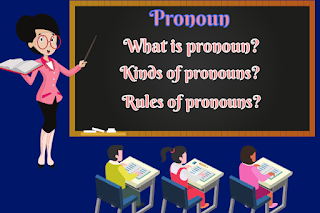Pronoun
So,
friends if you also want to know the most important lesson of English
grammar (pronoun). In this post we are going to study about (pronouns,
Kinds of pronouns, Rules of pronouns). to know this, continue this us.
Pronoun
What is pronoun ?
Pronoun is a word used in place of a noun in order to avoid repetition of the latter.
Kinds of Pronoun
1.) Personal pronouns
2.) Demonstrative Pronouns
3.) Relative Pronouns
4.) Interrogative Pronouns
5.) Infinite Pronouns
6.) Reflexive Pronouns
7.) Distributive pronouns
8.) Reciprocal pronouns
1.) Personal Pronouns:- The words used in place of noun referring to persons.
For example :- I, We, he, she, it, they, etc.
When we discuss about "Person" the following rules apply.
- First person, as in “I”
- Second person, as in “you”
- Third person, as in “It, he, she”
For more information click on the link 👉 (personal pronoun )
2.) Demonstrative Pronoun:- The words used for nouns to point out objects. like:- This, that, he, she, it, they, etc.
For example:- (i) This is my book. (ii) That is her house.
But in the following examples 'This' and 'That' are used as demonstrative adjective.
(i) This book. (ii) That house.
3.) Relative Pronouns:- The words used for nouns to express functions relating to 'who, which, that, whose, whim' etc.
For example:- (i) The man who has just entered the room is my friend.
(ii) The book that i bought is very costly.
4.) Interrogative Pronouns:- The words used for nouns to ask questions. Who? what? which? whose? whom?
For example:- (i) Who took my bag? (ii) What are you doing.
(iii) Whom did you meet? (iv) What shirt is this.
(v) Whose books are these? (vi) Whose book is this?
5.) Indefinite Pronoun:- The words used for noun in vague and general meaning 'everybody, nobody, somebody, either, neither, all, much, several, each, others, another' etc.
For example:- (i) All were late to the party.
(ii) Everyone loves to eat the chocolate.
6.) Reflexive pronouns:- The words as forms the personal pronouns for emphasis. 'myself, ourselves, himself, themselves, yourself' etc.
For example:- (i) I was in a hurry so, i washed the car myself.
(ii) That car is a the class all by itself.
(iii) you are too young to go out by yourself.
7.)
Distributive pronouns:- it is used for individuals and objects
referring to them as one at a
time.
'either, neither, each, every, none, anyone,' etc.
For example:- (i) Either of the two sisters is staying here.
(ii) Neither of his arms is defective.
(iii) You can take either room.
(iv) You can talk to each boy.
8.) Reciprocal pronouns:- The words used to to point out mutual relationship.
'each other, one another' etc.
For example:- (i) Both the brothers love each other.
(ii) Indians should not fight with one another.
Rules of pronouns
(Rule I)
When the subject of the verb is the receiver of the action, the action is said to be reflected. Such verbs are used reflexively.
'acquit, absent, avail, reconcile, amuse, resign, avenge, revenge, enjoy, exert, apply, adapt, adjust, pride, overreach, etc are used reflexively.
For example:- (i) You should avail yourself, of every chance in life.
(ii) They enjoyed picture last evening.
(iii) They enjoyed during summer vacation.
(iv) He resigned himself to his failure.
(v) The former DM acquitted very effciently.
(vi) He was determined to avenge the death of his wife.
(Rule II)
The following verbs are not used reflexively.
'keep, stop, turn, qualify, bathe, move, rest, hide' are not used reflexively.
For example:- (i) You should keep yourself from bad boys.
(ii) he has qualified himself for the post.
(iii) He hid himself in the room.
(iv) The thief hid money under the carpet.
(Rule III)
A reflexive pronoun cannot act as a subject or object of a verb unless it is preceded by pronoun or noun concerned.
For example:- (i) Myself will see to it that you get your share of property.
(ii) Yourself and he reached there in time.
(iii) I myself like him.
(iv) Raj will do it for myself and for my sister.
(Rule IV)
The verb 'to be' should be followed by subjective form when the complement is pronoun.
For example:- (i) It is me who have brought you home.
(ii) Was it her who did it for you?
(iii) It will be us who will buy a new house.
(Rule V)
Verbs are preposition are are followed by adjective case of a pronoun.
For example:- (i) Between you and I suhani is intelligent.
(ii) She is teaching rohit and 'she'.
(iii) Let they go.
Then,
friends if this article you feel good then you can also share this with
your friend.and after reading this article comment me in the comment
section how was it.
